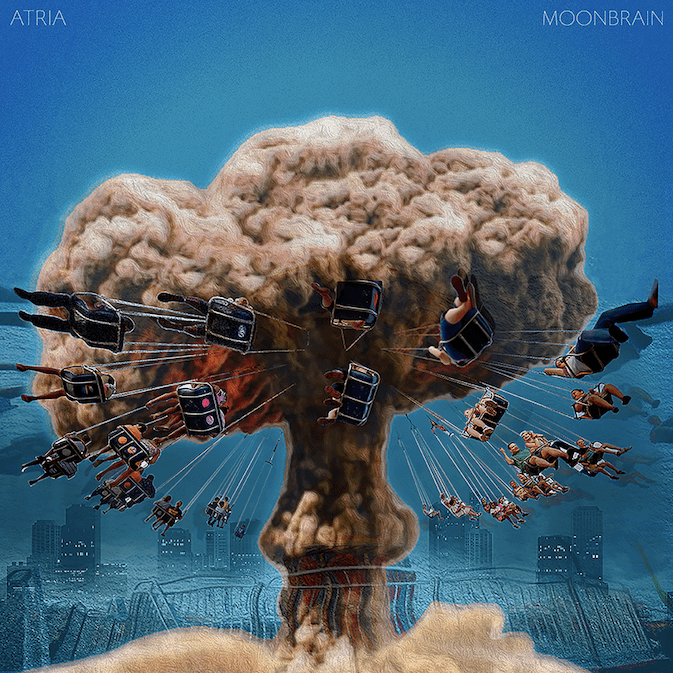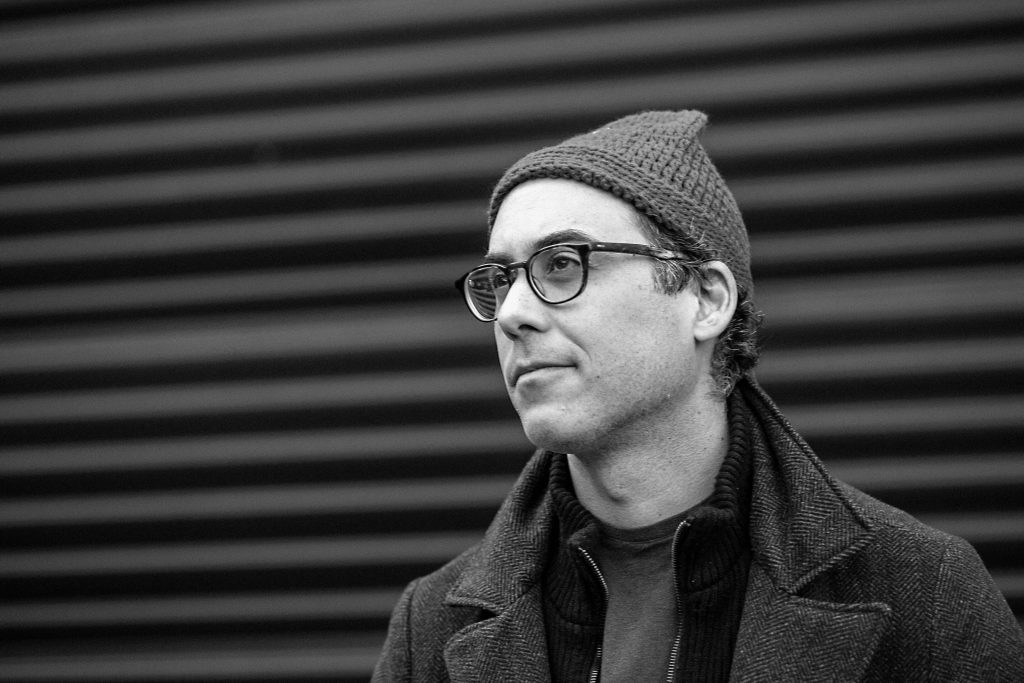Today marks the release of Moonbrain, the first solo album from renaissance musician and acclaimed author Travis Atria. An ambitious project, and in the fullness of time (to quote the title of one of the tracks), Moonbrain is a bricolage of poetry in both classical and modern sonic form — replete with hot beats, slithering guitars, and orchestral arrangements.

Though Moonbrain is Atria’s first solo album, it’s really his eighth release. From 2004–2013, Atria recorded his band Morningbell, and with side project the Slims. Morningbell always struck me in the same addictive kind of way as the Pixies — not least due to Travis’s sharp ear for melody and deeply intelligent lyrical spins. In the case of Morningbell’s “Marching Off To War,” in particular, Atria is the Black Francis to his own Joey Santiago with his uninhibited yowling and angular guitar hooks. Morningbell went on hiatus in 2014 when Atria’s brother, Eric (bass), and sister-in-law, Stacie (keyboards), started a family.
After years of recording and performing, Atria pursued his dream of writing. In 2016 he finished writing Traveling Soul: The Life of Curtis Mayfield with Mayfield’s son, Todd. His latest book, Better Days Will Come: The Life of Arthur Briggs, Jazz Genius of Harlem, Paris, and a Nazi Prison Camp, is the true story of jazz great Arthur Briggs. The saga races from Harlem in the Renaissance, to Paris in the Jazz Age, to a Nazi prison camp in World War II. Before Travis’s intensive research and penetrating study of the trumpeter, bringing the inscrutable to light, Briggs was largely left out of American music history. Historians even have a hard time pinpointing his birthdate. Traveling Soul is the first definitive biography of Curtis Mayfield, chronicling his life from humble beginnings in Chicago’s Cabrini Green projects, to his success with the Impressions, writing songs that inspired the Civil Rights movement, and making his masterpiece, Superfly. It was recognized with honorable mention by the Society of Midland Authors (past winners include Kurt Vonnegut and Studs Terkel).
Atria’s work has appeared in Rolling Stone, Vanity Fair, Billboard, Wax Poetics, Paste, People, and other publications. He also contributed a thought-provoking piece to ABS in honor of the 50th anniversary of Curtis, Mayfield’s debut solo album.
His own solo debut is an extension of his literary accomplishments, further refined into what he considers to be his most cohesive musical work to date.
“It’s interesting,” Atria tells me. “I mean, it was actually supposed to be the next Morningbell album, but I couldn’t really get them to work on it with me, because my brother and sister-in-law have kids now and they’re just in a different place. It’s exciting because it’s the nearest thing. My brother and I both started learning how to play guitar at the same time, and that was 26 years ago. Since then we’ve been playing together nonstop. So it’s kind of bizarre to be doing it without him. The band helped me figure out what the parameters were for what our sound was going to be. It does sound like a Morningbell album, but also different because I had total control over it for the first time.”
In Morningbell you hear Curtis Mayfield’s inspiration, a presence also felt on Moonbrain with Atria’s warm, familiar falsetto and soul guitar kicked into high gear. But there are the socially conscious, timely lyrics which follow the lead of Mayfield’s “painless preaching.” Experiences while researching and writing Better Days Will Come awakened inner seeds, and he found himself also writing Moonbrain. “I was in Paris. It was literally the day after I had visited the site of the Nazi prison camp where Arthur Briggs was held captive — the Unite the Right rally in Charlottesville. I was watching this happen on the news and I was aghast. I was, without exaggeration, scared to come back to America. I didn’t know what the hell I was coming back to.
“The president at that time had everybody kind of locked onto the ‘good people on both sides’ statement. But that’s not even the thing that bothered me. He declined to even really say much at all about it, like it was normal. And that to me was what was so chilling, because I just spent three, four years heavily researching the Holocaust and Nazi and how it happened with this book. I was in Paris right after Trump got elected. This was when there was fear Marine Le Pen was going to be elected in France. And then Bolsonaro in Brazil got elected.”
Atria takes his Mayfield influence one step further on Moonbrain than he ever did all those years in Morningbell, stating that he’s never really tried to write about the world. Being an uncle of two young children, he realizes that in order to justify spending as much as it takes to make an album, he should make something for posterity. “It’s very difficult to do, because you can easily become boring — too much and hitting people over the head with a message. That was the hardest part: figuring out how to write about what is going on and inject whatever wisdom I might have for my niece and nephew when they grow up and wonder why the world is so fucked up. Maybe they can listen to this album and it would give them some solace.”

Atria delicately approaches harsh themes of natural disasters and inequality in manifold creative ways. To achieve this without the contentious rhetoric is a nearly lost art. The smooth delivery of “Jazz Cigarette,” belying the hopeless and desperate exigencies of environmental protection, simply has not been done since Marvin Gaye’s “Mercy, Mercy Me (The Ecology).”
“Love Theme” features Dan Bailey (Father John Misty) on drums. Before slipping into a Spinners-style groove, you hear a recording of Atria’s great aunt interviewing his great-grandmother, Martha Ed — a Syrian refugee who fled her hometown at the age of 15 during a Turkish army invasion and made a life in America. The message of the song is the power of love in a time of calamity. It just happens to be her birthday on this day of album release. “That was an absolute coincidence, by the way, but I liked that it happened that way. She grew up in Northwest Syria. All I know is the family lore. According to the story that was passed down, the Turkish army invaded her town. And I think a Turkish soldier tried to rape her. So her mother sent her to America to protect her. At 15 years old she left her country never to return. I don’t know if she ever saw her mother. Our family scattered to the wind. Some of them went to Mexico; she ended up in Pennsylvania.”
When Atria was living in New York and visited Ellis Island, he found the manifest along with the picture of the ship on which she arrived. “She got married, started pumping out kids like they used to do and owned a grocery store. During the Depression, they would give food away to people for free, because people could didn’t couldn’t afford to buy it. She was an incredibly strong woman, and I was lucky to know her.”
Atria’s use of the Sylvia Plath-coined word “moonbrain” serves as a conceptual metaphor for the album, one he can apply to various subjects he touches on such as climate change and race relations. “No Name Street,” which follows the title track, refers to every city he’s ever lived in, from Gainesville, to Miami, to Manhattan. Each city has a street that separates the white side from the black side. “Everyone knows what street it is. Almost nobody talks about it.” We know human activity is pushing us to extinction. We know the boundary between races is literally a man-made dividing line. We do nothing. We are moonbrains.
“To me the album concept is the cover picture, because it is a literal interpretation of what I mean with this album. It is people swinging around like they’re at a county fair. They’re having a great time. They’re swinging around a mushroom cloud. We are literally the stupidest people in history. I think the concept of this album and the meaning of Moonbrain is that we know with almost excruciating precision that we are killing ourselves. And we are just ignoring it. It reminds me of the addict. They’ve died for addiction, if you’ve ever been around an addict near the end. It’s absolutely absurd, the world that we’ve created.”
Atria understands music is supposed to make you feel good and happy, but if you’re making art how do you not pay attention to the world around you? “Isn’t that what art is for? Every single artform I think there is some strong tradition of it being about truth, especially speaking truth to power — like Picasso painting Guernica or something. It is as serious as it has ever been. Every generation thinks that the world’s going to end, but we’re the first ones that know how it’s happening. It’s really hard to change something this big, because it’s the entire world that has to change.”
Of his songwriting evolution, Atria explains, “I wanted to do something kind of different and new. I think most of the things we did in Morningbell were more involved. There were very few instances where there wasn’t reinvention between projects. We got bored very quickly with things. For this album I use a lot more modern instruments, like Ableton. It’s a beat-making software that you program beats with. I use that for most of this album and try to make it kind of like a little more contemporary.
“I think that was difficult, too, because I had to learn this new thing. I didn’t know what I was doing with it, and I didn’t know how to fit it into what I do. But I’ve always found that to be a rewarding process, to set yourself a difficult goal, like when we made Boa Noite and I wanted a whole orchestra on this album. How are we going to do that? And then you figure out how to do it. And you know, it stretches you; it makes you better. And I think this album is a continuation of that.”
While he was working on the album for five years, he was writing three books. Since he couldn’t work on it as steadily as he was used to, there were many times in the process when he doubted himself. “I’m really proud of what it ended up becoming, because I didn’t give up. I think Morningbell was known for being all over the place on purpose. I think this album fits as a piece, not breakneck rushing through genres. I still am nervous to put it out. Why did I try to say something about the world? Why am I opening myself up to this? But it’s meaningful to me to tell the truth. I don’t think there’s anything on this album that’s not the truth, so that’s my defense in case anybody tries to shit all over it.”
With today’s exciting Moonbrain release comes the exclusive premiere track “Shine.” I find the inspiration for the song to be a little bit funny. What started out as his brother’s flippant dare to use the lyrics of the oldest preserved song in history turned out to be the album’s magnum opus, as far as I’m concerned. Straight out the gate, it just has this epic sound.
Of “Shine,” Atria says:
After listening to an early version of the album, my brother’s verdict was that it was too dark. I had an old edition of ‘Lapham’s Quarterly’ lying around, and inside it had the Seikilos epitaph, which is the oldest preserved song in history. The lyrics read: “While you live, shine / have no grief at all / life exists only for a short while /and Time demands his due.” He challenged me to write a song using it, so I did.
As my hero Bob Ross often said, “You need darkness to see the light.” Well, sometimes in the middle of the darkness, you must be the light. That’s what this song is about.
Moonbrain (out now via Gold Robot Records) tracklisting:
Moonbrain
No Name Street
Jazz Cigarette
Shine
In the Fullness of Time
Blood Moon
Love Theme
Lucky
Suite: What’s the World Coming To / 143
Make Time
Album Credits:
Travis Atria with
Eric Atria: Guitar
David Borenstein: Baritone Saxophone
Dan Bailey: Drums
Keith Ladd: Bass
Jason Prover: Trumpet
Doug Fischer: Trombone
Sam Moss and Audrey Campbell: Backing Vocals
Chris Hillman: Drums
Aaron Colverson: Violin
Jordan Burchel: Mixing
Brian Lucey: Mastering
Art Layout: Ricky Kendall
Moonbrain – Choose preferred music service
Connect with Atria: Official | Instagram | Twitter


